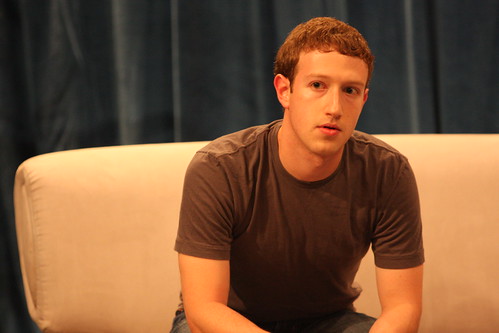Mark Zuckerberg announced in a short and sweet post today that Facebook is now home to one billion digital denizens. I’m not going to focus on the impact this news will have on its stock. Instead, I would like to focus on how this significant milestone aligns with his vision, a vision that was clearly communicated in the company’s S-1.
After re-reading Zuckerberg’s letter to investors, here are a few themes that resonate with me in light of this news…
Facebook was not originally created to be a company. It was built to accomplish a social mission — to make the world more open and connected. The social network hopes to strengthen how people relate to each other. Even though Facebook’s mission sounds big, the company is focusing on starting small — with the relationship between two people. Its focus is building tools to help people connect with the people they want and share what they want, and by doing this they are extending people’s capacity to build and maintain relationships.
Facebook observes that as people share more, they have access to more opinions from the people they trust about the products and services they use. As a result, the global social network strives to makes it easier to build meaningful relationships, discover the best products and improve the quality and efficiency of their lives.
This quote by Zuckerberg really captures the spirit of Facebook’s mission, “Today, our society has reached another tipping point. We live at a moment when the majority of people in the world have access to the internet or mobile phones — the raw tools necessary to start sharing what they’re thinking, feeling and doing with whomever they want. Facebook aspires to build the services that give people the power to share and help them once again transform many of our core institutions and industries.”
At 1 billion strong, Facebook is certainly closer to its vision than ever before. But, it’s still not enough to convince investors that it’s really on to something here…
It’s still not enough to convince skeptics who announce that they’re abandoning Facebook with every new social network that gains momentum…and those that re-emerge again and again.
It’s not enough that even at its previous count of 955 million users, that the network accounted for 12% of the world’s population.
Facebook’s news is indeed spectacular. While there are many fun, innovative, and and promising networks out there today, it is Facebook that is single-handedly making the digital and the real world a much smaller place. It is, despite is flaws, a primary residence for the digital YOU.
To celebrate this milestone, here are some interesting Facebook statistics that I thought I’d share with you…
– Facebook reached 1 billion monthly active users on September 14 at 12.45 PM Pacific time.
– Over 1.13 trillion likes since launch in February 2009.
– Facebook now has 600M mobile users.
– 140.3 billion friend connections.
– 62.6 million songs have been played 22 billion times – that’s about 210,000 years of music.
– The median age of a Facebook user is about 22 as the company hit 1 billion.
– Approximately 81% of Facebook’s monthly active users are outside the U.S. and Canada.
– When Facebook hit 500 million, the average social graph size was 305.
UPDATE: The Wall Street Journal published a wonderful infographic that paints a telling picture of the state of Facebook.
Connect with me: Twitter | LinkedIn | Facebook | Google+
The End of Business as Usual is officially here…








Thoughtful response to the big-billion-news. Facebook has indeed become the anchoring platform from which our identities online can call “home”, trying out new platforms and referencing our real lives back to it. As a historical document and primary source of human information, it has enormous potential. I’ll be interested to see what developments Zuckerberg makes in the future for mobile sharing and communication.
Cheers,
Sarah Bauer
Navigator Multimedia
claiming that their mission is to make people more connected is not true – their actions to restrict users’ post visibility is a proof. I understand that they need money, but that’s not the right way to collect them.
Zuckerberg is clearly speaking a foreign language to business people; in business, committed bodies means committed dollars. This simply does not translate in Facebook. The people have been given the power to share and it sounds as if Zuckerberg wants them, (the people), to be empowered to change industry as opposed to “victims” of industry via Facebook. Interesting philosophy.
Please… A social mission that brings the guy billions? Really? Why this new era where it is a shame to do business? Zuck = Wall Street but in a hoodie…
There’s an old saying; “the more righteous the pretense, the more self-serving the true motive.” That’s a good one.
When a medium becomes so pervasive that it does things that no other can, in common law it is designated a common carrier. This designation brings responsibilities as well as protections and privileges. Moreover, it is not voluntary. it is a matter of practice. When a system becomes a common carrier, according to basic definitions, it is regulated as such.
Facebook would do well to acknowledge that it is as much a common carrier as, say, the Yellow Pages were when there was only two in the USA, the one owned by AT&T or by General Telephone. Fact is, the Yellow Pages in its time was a bargain for retail advertisers — one purchase and you reached most everyone — and while it was regulated, it was also a windfall for the telephone system operators who used YP revenues to subsidize lower costs for telephone service.
I bring this example up to indicate the complexity of organically grown media monopolies like Facebook and why they need respect, but also regulation in the public interest to protect privacy, guard against undue leverage of the monopoly by Facebook’s owners, and generally ensure that service is high quality. In return, perhaps Facebook should collect a reasonable fee for its services rather than continually face financial ruin for giving away a lot.
In its defense against common carrier status, Facebook plays a familiar game — but one that is ultimately self-defeating, more ideologically than practically correct. Let’s hope some sense is eventually evident among those who provide Facebook, those who use it, and those who even the score.
The number of fake users increased dramatically since “companies” started selling Facebook likes and friends. Mr. Zuckerberg’s count presumably doesn’t include the massive amount of fake, duplicate and misclassified accounts, which constituted about 8.7 percent of users as of early August. We’re taking about more or less 90 million impostors.
It’s a number that I take into account in the infographic. But still, 90 million vs 1 billion, it’s still a significant number.
Regardless
of what Zuckerberg’s personal philosophies for Facebook might be now, that it
is accountable to its shareholders there will need to be much more focus on
leveraging those 1 billion users for revenue. While it does seem unlikely that
there will be a new social network that will be an immediate challenge to
Facebook’s popularity, the huge user base still has to be enticed into engaging
commercially on Facebook. So far this has been a struggle that Facebook isn’t
winning.
These are profound times. How ever you want to look at it. The strategies used in this day and age or constantly shape shifting. This article shows to me that I have a lot of catching up to do from yesterday
I think Facebook as Social medium works really well. Have you ever tried contact someone different. Now you can 🙂
As you create your social media profiles, be aware of what you are putting on them. What is on your social media profile reflects who you are and the opinions people form of you.